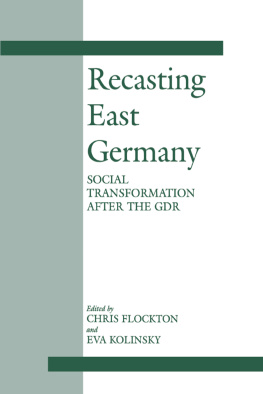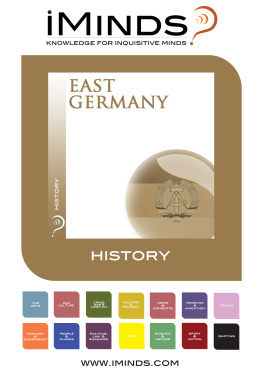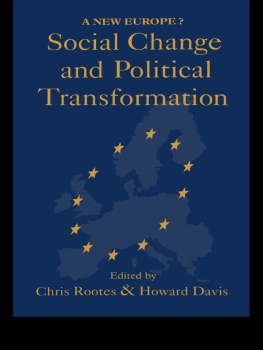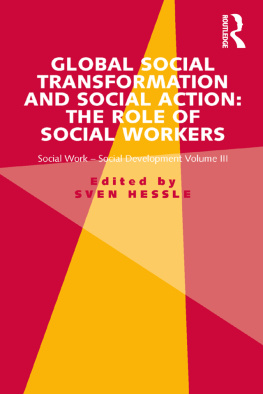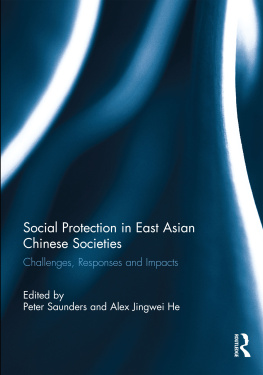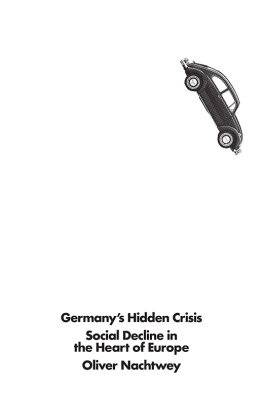RECASTING EAST GERMANY
BOOKS OF RELATED INTEREST
THE KOHL CHANCELLORSHIP
Edited by Clay Clemens and William E. Paterson
SUPERWAHLJAHR: THE GERMAN ELECTIONS IN 1994
Edited by Geoffrey K. Roberts
CONSTITUTIONAL POLICY IN UNIFIED GERMANY
Edited by Klaus H. Goetz and Peter J. Cullen
FEDERALISM, UNIFICATION AND EUROPEAN INTEGRATION
Edited by Charlie Jeffery and Roland Sturm
Recasting East Germany:
Social Transformation
after the GDR
Edited by
CHRIS FLOCKTON
and
EVA KOLINSKY
FRANK CASS
LONDON PORTLAND, OR
First published in 1999 in Great Britain by
FRANK CASS AND COMPANY LIMITED
2 Park Square, Milton Park, Abingdon, Oxon, OX14 4RN
and in the United States of America by
FRANK CASS
270 Madison Ave, New York NY 10016
Transferred to Digital Printing 2006
Website: http://www.frankcass.com
Copyright 1999 Frank Cass & Co. Ltd.
British Library Cataloguing in Publication Data
Recasting East Germany: social transformation after the GDR
1. Post-communism Germany (East) 2. Germany (East)
Economic conditions. 3. Germany (East) Social conditions
I. Flockton, Christopher II. Kolinsky, Eva
330.94310879
ISBN 0 7146 4936 8 (hbk)
ISBN 0 7146 4496 X(pbk)
Library of Congress Cataloging-in-Publication Data
Recasting East Germany: social transformation after the GDR/
edited by Chris Flockton and Eva Kolinsky.
p. cm.
First appeared in a special issue of German Politics, Vol.7, No.3,
December 1998 T.p. verso.
Includes index.
ISBN 0-7146-4936-8 (h/back). ISBN 0-7146-4496-X (p/back).
I. Germany (East) Social conditions. 2. Germany (East)
Economic conditions. I. Flockton, Christopher. II. Kolinsky, Eva.
HN460.5.A8R43 1999
306.0943dc21
98-44192
CIP
This group of studies first appeared in a Special Issue of Germany Politics,
Vol.7, No.3 (December 1998), ISSN 0964-4008
[Recasting East Germany: Social Transformation after the GDR].
All rights reserved. No part of this publication may be reproduced, stored in a retireval system, or transmitted in any form, or by any means, electronic, mechanical, photocopying, recording or otherwise without the prior permission of Frank Cass and Company Limited.
Publisher's Note
The publisher has gone to great lengths to ensure the quality of this reprint but points out that some imperfections in the original may be apparent
Acknowledgements
The contributions assembled in this volume arose from an ESRC-funded seminar on Social Transformation and the Family at the University of Potsdam, and from meetings of the Social Transformation Study Group of the Association for the Study of German Politics (ASGP). Special thanks for helpful comments on draft papers and in discussion are due to Rainer Dobbelstein, Charley Jeffery, Hildegard Maria Nickel, Ilona Ostner and Willie Paterson.
Recasting East Germany:
An Introduction
CHRIS FLOCKTON and EVA KOLINSKY
When the eastern German Lnder opted to join the Bundesrepublik on 3 October 1990, they entered the uncharted waters of recasting a political system, an economic order and a society that had been shaped by 40 years of socialist control. The brief interlude of parliamentary government in the closing months of the GDR had already ended one-party dominance but did not set an agenda for the future. Prior to the elections on 18 March 1990, the last unelected Minister President of the GDR, Hans Modrow, tried to shield existing structures, elites and institutions from change, although the Round Table, the main innovative force at the time, prepared a constitution to replace the discredited socialist model with a better one. Since its authors shared the basic political assumptions of the regime they purported to recast, their efforts had no lasting impact. Following the March elections, the CDU-led government of Lothar de Maizire did what it had been mandated to do: passing the legislation and authorising the procedures required to facilitate unification. A first benchmark, the Treaty on Economic, Monetary and Social Union, was reached in 1 July 1990. It unified currencies by introducing the Deutschmark in the GDR and directing its economy and financial institutions to reorganise along market principles. Ratified by the parliaments of the two German states, the Treaty of German Unity finally detailed the system transfer from west to east and turned the Basic Law into the constitution for the whole of Germany.
Compared with the processes of post-communist transformation elsewhere in eastern Europe, east Germany occupied a special and privileged position. this east Germany is neither a replica of the FRG nor a continuation of the former GDR, but has an emerging, albeit problem-laden and unsettled, identity of its own.
In exploring this fractured identity, Recasting East Germany presents detailed case studies of key areas of economic and social organisation and explores how they have been transformed since unification. On the one hand, the volume takes stock of structural transformation and shows what has happened in east Germany during the last decade. On the other hand, Recasting East Germany considers the complex issue of whether social transformation was inevitable in the direction it has taken and whether it has been successful. Measuring success is, of course, as varied as transformation itself and will not render one answer that could apply to all areas. While focusing on specific aspects of economic and social development since unification, the chapters in this volume will ask common questions with regard to the transformation process and its impact: Has it achieved what it set out do? Were aims defined at the outset and backed by the individuals who would be involved and affected by it? Has the actual transformation that followed the system transfer from the west built confidence in post-unification developments and created opportunities of social participation or has it generated new mechanisms of exclusion and new patterns of inequality?
PHASES OF TRANSFORMATION
During the first years after unification, recasting the system dominated the agenda of transformation. This first phase lasted until 1994 when the Treuhand, the agency designed to administer the privatisation of state-owned enterprises in the former GDR, declared its task accomplished, when interim financial support that had been provided by the German government to cushion the negative effects of transformation on the labour market, on incomes and on the cost of living generally came to an end. This first phase of transformation also included the 1994 elections in the new Lnder and at federal level, which broadly confirmed the two main parties, CDU and SPD, as the preferred parties of government in east Germany, albeit with reduced margins and amidst reduced electoral participation, in particular among young east Germans.
Despite its ossified character, however, it created an essentially predictable social environment for east Germans, allocating them to education, training, employment, housing with little scope for choice and equally little exposure to uncertainties. In the recast east Germany, uncertainties and the dismemberment of state-administered life-courses go hand in hand. Had unification gone to plan, the elevator effect (Ulrich Beck) might have replicated conditions during the economic miracle when living standards rose across the board and (west) Germans developed a sense that their socio-economic future was secure.

